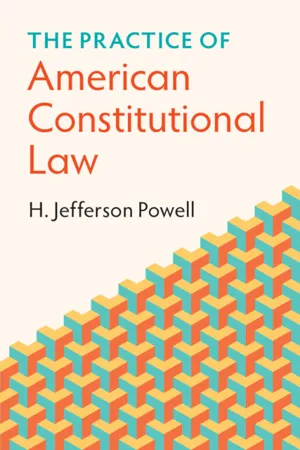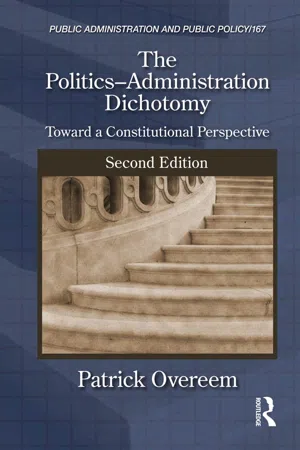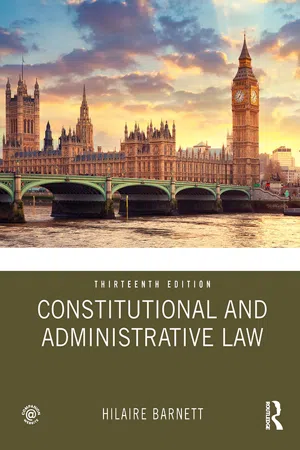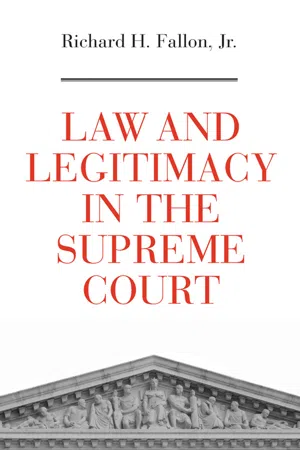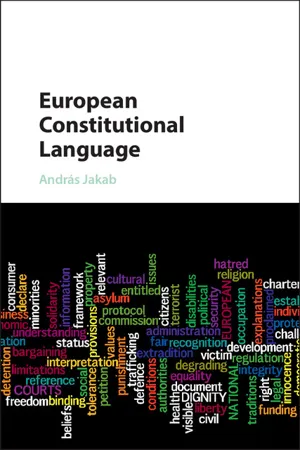Law
Constitutional Doctrine
Constitutional doctrine refers to the principles and interpretations that guide the application of a country's constitution. It encompasses the legal framework for understanding and implementing constitutional provisions, including the separation of powers, federalism, and individual rights. Constitutional doctrine plays a crucial role in shaping the legal and political landscape of a nation.
Written by Perlego with AI-assistance
Related key terms
1 of 5
9 Key excerpts on "Constitutional Doctrine"
- Nicholas Papaspyrou(Author)
- 2018(Publication Date)
- Hart Publishing(Publisher)
They are not isolated. In fact, Professor Fallon has expanded upon the insight of under-enforcement and has argued for a fundamental and pervasive distinction between constitu-tional meaning and the doctrine the Court crafts for the purpose of implementing 183 The Dual Character of Constitutional Doctrine the Constitution. 14 For our purposes, it is important to note that Constitutional Doctrine is the main mechanism enabling the Court to arrange the division of interpretive labour in implementing constitutional norms; not merely in the field of judicial passivity, but throughout the realm of constitutional review. We will examine shortly the operation of this function in areas of heightened judicial scrutiny. But first, let us draw the major theoretical implications from the insight of judicial under-enforcement. The divergence between (under-enforced) constitutional law and judicial doc-trine reflects what we may call the dual character of Constitutional Doctrine. First, doctrine has a substantive function; it provides an interpretation of the normative content of substantive constitutional law . Yet, such interpretation sometimes covers only part of applicable law, capturing violations of a certain kind or magnitude. In this sense, Constitutional Doctrine diverges from exhaustive formulations of applicable constitutional law on the same level of generality. Secondly, it has an institutional function, regulating the applicable scope and intensity of review and thereby organising the judicial interpretive assignment. It specifies norms of adju-dication governing the role of courts over issues of constitutional specification in the process of resolving disputes. Such institutional norms supply propositions of a higher order.- eBook - PDF
- H. Jefferson Powell(Author)
- 2022(Publication Date)
- Cambridge University Press(Publisher)
A dissenter came to the opposite judgment. “The core dispute in this case is whether Robinson prohibits only the criminalization of status, or also of conduct compelled by status. I am satisfied that Robinson is better understood as distinguishing status from conduct,” a conclusion he thought consistent with most other cases applying Robinson, and with a lower court’s obligation to respect the limits inherent in the Supreme Court precedent. Either judgment – in my judgment (!) – is defensible. 71 Doctrine. Important as analogical reasoning is in argument from precedent, what we shall call doctrinal reasoning is perhaps even more central to this form of argument derived from the Constitution-in-practice. The Supreme Court often employs the word “doctrine” in discussing constitutional law, but it has never offered a definition of the term. The word is sometimes used very broadly and quite sensibly to refer to all the “rules and principles of constitutional law . . . that are capable of statement and that generally guide the decisions of courts, the conduct of govern- ment officials, and the arguments and counsel of lawyers,” the idea that in this book is referred to as the Constitution-in-practice. However, I am going to reserve “doctrine” to refer to the particular subset of precedent-based argument that is characterized by adherence to formal rules and principles that the precedent expressly announces. Doing so will enable us to identify important, shared features of all such arguments. 72 As discussed earlier, because of the Supreme Court’s unique, structurally essential role in ensuring that constitutional law is principled, coherent and reasonably uniform across the Republic, stare decisis requires the Court and other constitu- tional decision makers “to adhere not only to the holdings of [the Court’s] prior 71 Manning v. Caldwell, 930 F.3d 264, 283 (4th Cir. 2019) (en banc); id. - eBook - PDF
Constitutional Limits and the Public Sphere
A Critical Study of Bentham's Constitutionalism
- Oren Ben-Dor(Author)
- 2000(Publication Date)
- Hart Publishing(Publisher)
90 To sum up, a constitutional law had to be understood as being a resolution of an extra-institutional interpretative process. It had an element of “legality”, in that it complied with the conceptual requirement of a law. From the point of view of “descriptive sociology”, it would make more sense to give an exposition of constitutional limits as the synergy of two constitutional “laws”. The first of these “laws”, communally-based moral law, would be reflected in and interact with the second, a correspondent institutional constitutional law in principem . 91 This socially dynamic manifestation of constitutional law would also reflect the social dynamism which characterised the concept of sovereignty. The relationship between constitutional law and other branches of law What was the relationship between constitutional law and other branches of law, namely civil, penal and procedural? Bentham claimed that the quality of the other branches of the law would depend on the basic interests from which they stemmed and which they endeavoured to protect. Constitutional law would determine the aptitude of the people in power and would constantly check their interest. Bentham said in this context that although the supreme operative 92 would be the body whose laws were immediately apparent: “Still however it is the constitutional branch that is the most important of the two as being that on which the other depends for all its qualities and all its effects, as an effect upon its proximate cause.” 93 Constitutional law was the most important branch of law, because of its two dimensional nature. It was legislation about legislation. 94 It would determine which interests would determine all other legislation. Constitutional law would ensure that the whole system of penal law accorded with the universal interest. It would determine the end in view of any individual law. - eBook - ePub
The Politics-Administration Dichotomy
Toward a Constitutional Perspective, Second Edition
- Patrick Overeem(Author)
- 2017(Publication Date)
- Routledge(Publisher)
co-ordination ” (1998: 362; cf. pp. 362–368, 376, 409, 417). Both elements are important, but overall the emphasis in constitutional theory seems to lie on the prevention of tyranny rather than on the prevention of anarchy. This asymmetry makes the integration of constitutionalism with administrative thought (which is typically more concerned with performative values such as effectiveness and efficiency) often particularly difficult.* These two sides of constitutionalism have been indicated by the Latin words gubernaculum and jurisdictio (Maddox 1982: 808–809). In a well-known exchange, Giovanni Sartori and Graham Maddox debated which of the two is the primary purpose of constitutionalism: checking government power in order to guarantee the freedom of citizens against public power (Sartori 1962, 1984), or establishing government power in order to protect citizens against private powers (Maddox 1982, 1984). As could be expected, the debate has not ended and is still undecided.Constitutional principles concern the distribution of authority within a polity, and so they do not specify exact interactions but tend to be rather general and gross. Constitutional principles, says Vile, “have the same relation to political action as military strategy has to tactics”: they set broad goals without specifying the details of (the proper action in) each particular situation (1998: 326; cf. pp. 8–9). Because of their general character, constitutional principles are not restricted to one particular national context. The doctrine of the separation of powers, for instance, has different meanings and applications in the United States, France, and Great Britain, to name only some important countries (Gwyn 1965; Rutgers 2000; Vile 1998). Nevertheless, these conceptions are sufficiently similar to make comparisons between them possible and sensible.Grey (1979) has presented an analytical framework to classify constitutional principles or norms, as he calls them, on three dimensions. First, their status can be described as extralegal (uncodified, unenacted), as ordinary law, or as fundamental law (inflexible and overriding). Second, the way in which constitutional principles are enforced may be either political or special. Grey speaks of political enforcement when the constitutionality of legislation is ultimately determined by the “ordinary lawmaking and law-approving bodies” and of special enforcement when this is done by other bodies, mostly constitutional courts or committees (1979: 196). Finally, constitutional principles vary with respect to the source of their authority: some are based on claims to reason and truth or self-evidence (as in the case of natural-law-inspired norms), others on claims to usage and acceptance, and a third group on legal enactment. This framework helps to characterize the politics–administration dichotomy. How exactly the dichotomy functions as a constitutional principle will differ from country to country, but in general, it seems that the dichotomy itself is mostly extralegal (it is uncodified and not formulated explicitly in most constitutions), although ordinary legislation can be and often actually is derived from it. The fact that the politics–administration dichotomy is normally not codified and enacted as law does not make it less important, however, not even in a legal sense: “A supreme enacted constitution may coexist with unenacted constitutional norms that have the full status of judicially enforceable fundamental law” (Grey 1979: 205). Further, the dichotomy seems to be upheld by different bodies in different countries, depending on whether there is judicial review by a constitutional court (as in the United States) or not (as in the Netherlands). Lastly, the dichotomy seems to derive its authority in most cases mainly from a claim to reasonableness and secondarily perhaps from a claim to usage and acceptance. It mostly does not derive its authority from legal enactment. - Se-shauna Wheatle(Author)
- 2017(Publication Date)
- Hart Publishing(Publisher)
Phrased in other terms, while there may be parallels with the old common law respect for natural law, the use of implied principles is not founded on a vague notion of ‘pre-political natural rights’, but on a particular conception of what law is and what pursuits it serves in the society in question. 120 36 Implied Principles and Constitutionalism IV. CONCLUSION The use of implied constitutional principles in the common law jurisdictions examined in this study is firmly rooted in the concept of constitutional-ism and the idea of principles as norms applicable as optimal standards in interactions between the individual and the state. The necessary discourse reaches beyond the conceptual and theoretical context and encompasses the search for legitimacy on the part of the court and the state in the application of the constitution. There is accordingly an interplay of institutional and doctrinal considerations that influence judicial reasoning by implied con-stitutional principles in fundamental rights cases. This interplay of factors points to the special significance of separation of powers and the rule of law as foundational constitutional principles. The analysis in this chapter sets the stage for much of the proceeding conversation on the role of implied constitutional principles in rights adju-dication. In the following chapters, issues regarding implication in inter-pretation, the nature of principles, and varying models of constitutionalism comprise the critical conceptual landscape. These issues therefore emerge— explicitly or implicitly—in the subsequent analysis of applications of separation of powers and rule of law, the functions played by implied con-stitutional principles in rights cases, and questions regarding the legitimacy of judicial invocation of constitutional principles. 1 Jeffrey Jowell, ‘The Rule of Law’s Long Arm: Uncommunicated Decisions’ [2004] Public Law 246, 246.- eBook - ePub
- Hilaire Barnett(Author)
- 2019(Publication Date)
- Routledge(Publisher)
The rule of law represents one of the most challenging concepts of the constitution. The rule of law is a concept which is capable of different interpretations by different people, and it is this feature which makes an understanding of the doctrine elusive. Of all constitutional concepts, the rule of law is also the most subjective and value laden. The apparent uncertainties in the rule of law and its variable nature should not cause concern, although, inevitably, it will cause some insecurity. In the study of the rule of law, it is more important to recognise and appreciate the many rich and varied interpretations which have been given to it, and to recognise the potential of the rule of law for ensuring limited governmental power and the protection of individual rights, than to be able to offer an authoritative, definitive explanation of the concept.The rule of law may be interpreted either as a philosophy or political theory which lays down fundamental requirements for law, or as a procedural device by which those with power rule under the law. The essence of the rule of law is that of the sovereignty or supremacy of law over man. The rule of law insists that every person – irrespective of rank and status in society – be subject to the law. For the citizen, the rule of law is both prescriptive – dictating the conduct required by law – and protective of citizens – demanding that government acts according to law. This central theme recurs whether the doctrine is examined from the perspective of philosophy, or political theory, or from the more pragmatic vantage point of the rule of law as a procedural device. The rule of law underlies the entire constitution and, in one sense, all constitutional law is concerned with the rule of law. The concept is of great antiquity and continues to exercise legal and political philosophers today.The rule of law cannot be viewed in isolation from political society. The emphasis on the rule of law as a yardstick for measuring both the extent to which government acts under the law and the extent to which individual rights are recognised and protected by law, is inextricably linked with Western democratic liberalism.1 - eBook - PDF
- Richard H. Fallon Jr., Richard H. Fallon(Authors)
- 2018(Publication Date)
- Belknap Press(Publisher)
In particular, we should reflect on the relationship between prescriptive constitutional theories and our case-by-case judgments of constitutional correct-ness, reasonableness, and legal and moral legitimacy. Prescrip-tive constitutional theories offer methodologies or guidelines for reaching correct or legitimate decisions in individual cases. But our judgments concerning the merits of constitutional theories are not, and could not be, wholly independent of the results that they yield. We have case-specific intuitions about good and acceptable out-comes because we know that constitutional law is interconnected with substantive morality in a variety of complex ways. 45 142 CONSTITUTIONAL THEORY At the same time, our judgments about particular cases are sensi-tive to our judgments about proper decision-making methodology within our practice as we currently understand it. This sensitivity necessarily exists if we take the idea of legally and morally legitimate judicial power seriously. Even if we are socialists or libertarians, if we know anything about constitutional law, we know that it has enough partial autonomy to foreclose the conclusion that the Con-stitution dictates socialist or libertarian conclusions to every issue of public policy. Considerations involving constitutional text, prece-dent, and interpretive integrity intrude. Constitutional reasoning and argument require methodological premises, including ones for de-termining what past authorities have resolved, and those premises may sometimes point us toward surprising or unwanted results. In thinking about how case-specific intuitions and general meth-odological premises relate to one another as aspects of constitu-tional interpretation—especially but not exclusively in the Supreme Court—we can profitably consider an analogy drawn from moral and political philosophy. - eBook - PDF
Vienna Lectures on Legal Philosophy, Volume 1
Legal Positivism, Institutionalism and Globalisation
- Christoph Bezemek, Michael Potacs, Alexander Somek, Christoph Bezemek, Michael Potacs, Alexander Somek(Authors)
- 2018(Publication Date)
- Hart Publishing(Publisher)
In this democratic process, we settle authoritatively by positive law any reasonable disagreements we have about what is to count as just among us. Politics, in such an understanding, is the process of authoritative determination, by way of enacting positive law, of what is to count as just among free and equal citizens under condi-tions of reasonable disagreement about what that means. 25 Constitutions in this understanding seek to establish standards for legal validity that ensure that all positive law actually reflects these three basic ideas that are central to the establishment of legitimate authority. Constitutionalism is law in its reflexive form: it seeks to establish as a matter of law the critical resources for ensuring that law actually has the authority it claims to have. Put another way, constitutionalism seeks to establish conditions for legal validity that are identical to those required for the realisation of the rule of law. Such an integrative conception of constitutionalism and legitimate authority meets all the requirements established in section III. It thus fits with the various ways we talk about the rule of law. This is not the place to justify such a conception of legitimate authority in terms of political morality, even though I believe that such an endeavour can be, and, to an incomplete and imperfect extent, has already been, undertaken. 26 Nor is it possible here to work out in greater detail the more concrete institutional, procedural and substantive implications of such a concep-tion of constitutionalism. 27 It is, however, possible to highlight three central fea-tures connected to the embrace of the constitutionalist rule of law as it is set out here and then to describe two corollaries. First, all plausible claims of legitimate authority are connected to legal authori-sations. The rule of law means that there really is no legitimate authority in politics outside of the law. - eBook - PDF
- András Jakab(Author)
- 2016(Publication Date)
- Cambridge University Press(Publisher)
If this doctrinal concept or principle is defined by referring to another legal rule, then it is a contextual harmonising argument; if by referring to, for instance, a precedent, then it is a reference to an interpretive precedent. ‘Interpreting the constitution in the light of doctrinal concepts and principles’ in the strict sense means that neither of the above is used for supporting the content of the given general concept, but this content is just defined as obvious. Given that a conceptual definition is not usually regarded as binding in itself (without a background in a legal rule or a decision), 55 such inter- pretative references to legal concepts are methodologically questionable. A characteristic example of such arguments in Hungary is the reference to the separation of powers without linking it to any particular provision of the Constitution. 56 In Spanish case-law, the principle of interpreting all statutes in conformity with the Constitution is said to be a general (constitutional) principle. 57 3.2.4 Arguments from silence Real lawyerly reasoning makes use not only of the text, but also of its absence in order to interpret the constitution. Characteristic forms of this include principles like expressio unius exclusio alterius (‘expressing the one means excluding the other’), qui de uno dicit, de altero negat (‘stating the one means rejecting the other’), 58 argumentum a contrario (stating 54 We call arguments from a name or designation argumentum a notatione. 55 In the case of an argument, the lack of binding force means that it may be countered by asking ‘So what?’. Arguments with no binding force show the mere possibility of a solution, the acceptance of which has to be supported with arguments having binding force. 56 See, e.g., Dec. Hung. CC 42/2005. (XI. 14.) AB, ABH 2005, 504, 526, with further references. 57 Decision of the Spanish Constitutional Court No. 2/81 and 77/83. 58 François Ost – Michel van de Kerchove, Entre la lettre et l’esprit.
Index pages curate the most relevant extracts from our library of academic textbooks. They’ve been created using an in-house natural language model (NLM), each adding context and meaning to key research topics.

